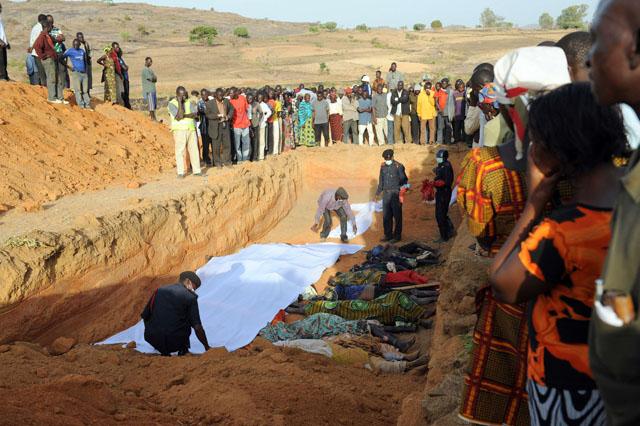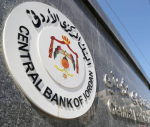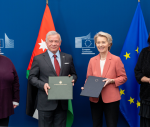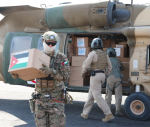You are here
At least 100 killed in Nigeria attacks as gunmen storm villages
By AFP - Mar 16,2014 - Last updated at Mar 16,2014

KANO, Nigeria — At least 100 people were killed in the religiously divided centre of Nigeria this weekend, local officials said on Sunday, as tensions between Muslim-dominated herdsmen and mostly Christian farmers again turned deadly.
About 40 assailants armed with guns and machetes stormed the villages of Angwan Gata, Chenshyi and Angwan Sankwai, attacking locals in their sleep and torching their homes, Yakubu Bitiyong, a lawmaker at the Kaduna state parliament told AFP.
“We have at least 100 dead bodies from the three villages attacked by the gunmen” overnight Friday-Saturday, he said, adding that scores of residents were also injured.
Some of the victims “were shot and burnt in their homes while others were hacked with machetes”, Bitiyong said.
According to a local government official who asked not to be named, around 2,000 people displaced by the attacks were now sheltering in a primary school in Gwandong village.
Kaduna state police spokesman Aminu Lawan confirmed the attacks but refused to give a casualty toll or say who was behind the violence.
Local residents, mostly Christians, blamed the bloodshed on Muslim Fulani herdsmen, who have been accused of similar raids in the past.
Chenshyi village was the worst affected with at least 50 people killed, said Adamu Marshall, a spokesman for the Southern Kaduna Peoples’ Union, a regional political and cultural body.
“Many people are still in the bush, afraid to return to their burnt homes,” he told AFP, confirming a total toll of at least 100 dead.
“The attackers looted food and set fire to the barns during the attacks,” he added.
Kaduna State Governor Mukhtar Ramalan Yero was to cut short a visit to the United States in response to the violence, his spokesman said.
Fulani leaders have for years complained about the loss of grazing land which is crucial to their livelihood, with resentment between the herdsmen and their agrarian neighbours rising over the past decade.
Most of the Fulani-linked violence has been concentrated in the religiously divided centre of the country, where rivalries between the herdsmen and farmers have helped fuel the unrest.
Nigeria is almost evenly split between the Muslim majority north and largely Christian south. Religion and ethnicity underpin daily life.
Kaduna and the neighbouring state of Plateau make up Nigeria’s so-called middle belt where the two religions often clash.
The weekend attacks in the flashpoint region recall the sectarian-fuelled violence following the last presidential elections in 2011, which saw southern Christian Goodluck Jonathan defeat northern Muslim candidate Muhammadu Buhari.
Buhari’s supporters took to the streets, claiming the vote was rigged. Their protest became violent and Human Rights Watch estimated that more than 500 people were killed, most of them Muslims, in southern Kaduna.
The run-up to the next presidential vote in February 2015 has again been dominated by a row between northern Muslims and Christians, this time in Jonathan’s own ruling party, where northerners claim a candidate from their regions should run.
Jonathan has yet to officially declare that he will stand for re-election but his apparent refusal to step aside has prompted a series of defections of governors, lawmakers and senators to the opposition.
Related Articles
Lagos - Herders are believed to have killed 25 villagers in central Nigeria's Plateau state, police said on Wednesday, in the latest violenc
Rescue workers on Wednesday combed through the rubble of Nigeria’s deadliest bomb attack after at least 118 people were killed in the central city of Jos, with Boko Haram blamed for the atrocity.
LAGOS — One week after gunmen attacked a train with explosives in northwestern Nigeria, the whereabouts of 168 passengers are still unknown,

















